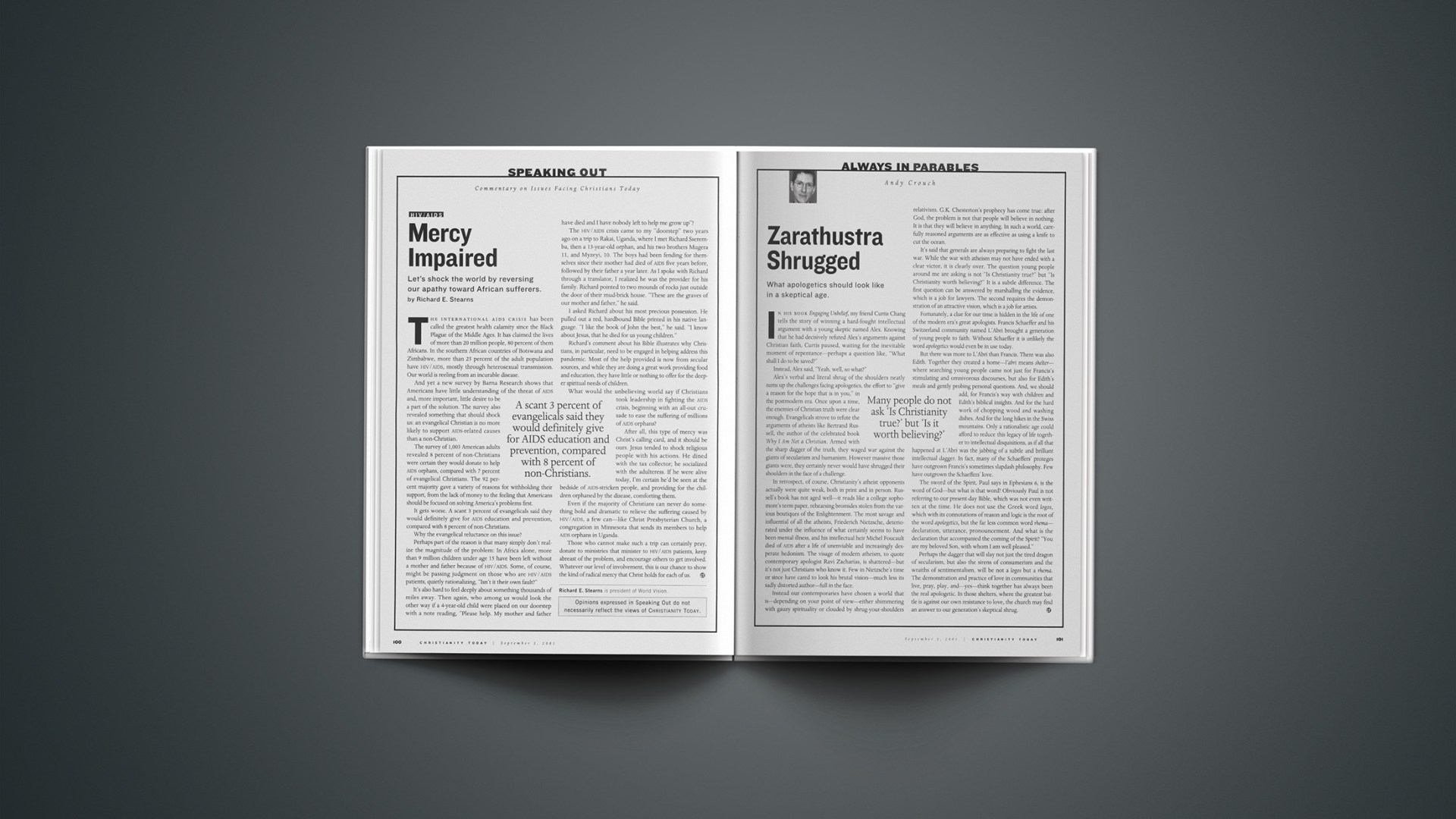Instead, Alex said, “Yeah, well, so what?”
Alex’s verbal and literal shrug of the shoulders neatly sums up the challenges facing apologetics, the effort to “give a reason for the hope that is in you,” in the postmodern era. Once upon a time, the enemies of Christian truth were clear enough. Evangelicals strove to refute the arguments of atheists like Bertrand Russell, the author of the celebrated book Why I Am Not a Christian. Armed with the sharp dagger of the truth, they waged war against the giants of secularism and humanism. However massive those giants were, they certainly never would have shrugged their shoulders in the face of a challenge.
In retrospect, of course, Christianity’s atheist opponents actually were quite weak, both in print and in person. Russell’s book has not aged well—it reads like a college sophomore’s term paper, rehearsing bromides stolen from the various boutiques of the Enlightenment. The most savage and influential of all the atheists, Friederich Nietzsche, deteriorated under the influence of what certainly seems to have been mental illness, and his intellectual heir Michel Foucault died of aids after a life of unenviable and increasingly desperate hedonism. The visage of modern atheism, to quote contemporary apologist Ravi Zacharias, is shattered—but it’s not just Christians who know it. Few in Nietzsche’s time or since have cared to look his brutal vision—much less its sadly distorted author—full in the face.
Instead our contemporaries have chosen a world that is—depending on your point of view—either shimmering with gauzy spirituality or clouded by shrug-your-shoulders relativism. G.K. Chesterton’s prophecy has come true: after God, the problem is not that people will believe in nothing. It is that they will believe in anything. In such a world, carefully reasoned arguments are as effective as using a knife to cut the ocean.
It’s said that generals are always preparing to fight the last war. While the war with atheism may not have ended with a clear victor, it is clearly over. The question young people around me are asking is not “Is Christianity true?” but “Is Christianity worth believing?” It is a subtle difference. The first question can be answered by marshalling the evidence, which is a job for lawyers. The second requires the demonstration of an attractive vision, which is a job for artists.
Fortunately, a clue for our time is hidden in the life of one of the modern era’s great apologists. Francis Schaeffer and his Switzerland community named L’Abri brought a generation of young people to faith. Without Schaeffer it is unlikely the word apologetics would even be in use today.
But there was more to L’Abri than Francis. There was also Edith. Together they created a home—l’abri means shelter—where searching young people came not just for Francis’s stimulating and omnivorous discourses, but also for Edith’s meals and gently probing personal questions. And, we should add, for Francis’s way with children and Edith’s biblical insights. And for the hard work of chopping wood and washing dishes. And for the long hikes in the Swiss mountains. Only a rationalistic age could afford to reduce this legacy of life together to intellectual disquisitions, as if all that happened at L’Abri was the jabbing of a subtle and brilliant intellectual dagger. In fact, many of the Schaeffers’ proteges have outgrown Francis’s sometimes slapdash philosophy. Few have outgrown the Schaeffers’ love.
The sword of the Spirit, Paul says in Ephesians 6, is the word of God—but what is that word? Obviously Paul is not referring to our present-day Bible, which was not even written at the time. He does not use the Greek word logos, which with its connotations of reason and logic is the root of the word apologetics, but the far less common word rhema—declaration, utterance, pronouncement. And what is the declaration that accompanied the coming of the Spirit? “You are my beloved Son, with whom I am well pleased.”
Perhaps the dagger that will slay not just the tired dragon of secularism, but also the sirens of consumerism and the wraiths of sentimentalism, will be not a logos but a rhema. The demonstration and practice of love in communities that live, pray, play, and—yes—think together has always been the real apologetic. In those shelters, where the greatest battle is against our own resistance to love, the church may find an answer to our generation’s skeptical shrug.
Copyright © 2001 Christianity Today. Click for reprint information.
Related Elsewhere
Curtis Chang’s Engaging Unbelief is available at Christianbook.com.In 1997, Christianity Today examined the vision and frustrations of Francis Schaeffer.
L’Abri‘s site offers more information about the community.
There are several sites devoted to the life and writings of Francis Schaffer, including The Shelter and Antithesis.
Crouch is editor-in-chief of re:generation quarterly.
Many of Crouch’s other writings are available at his and his wife’s Web site.
Earlier Andy Crouch columns for Christianity Today include:
Consuming Passions | One man’s “testimony” from the First Great Mammon Awakening. (July 10, 2001)
Generation Misinformation | Forget the latest PowerPoint seminars on Generations X-Z. (May 16, 01)
Dead Authors Society | We’re no longer interested in tasting death but only little morsels of cheer. (Mar. 28, 2001)
Promises, Promises | Our technology works. But all idols do at first. (Feb. 21, 2001)
A Testimony in Reverse | I have discovered how inconvenient it can be when God actually does speak. (Feb. 5, 2001)
Crunching the Numbers | A modest proposal for measuring what really matters in church life. (Dec. 20, 2000)










